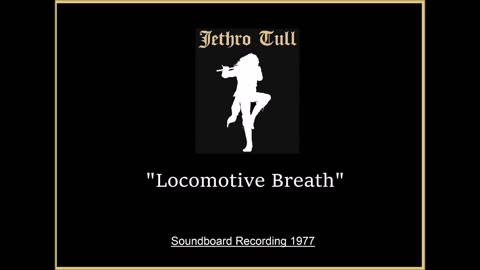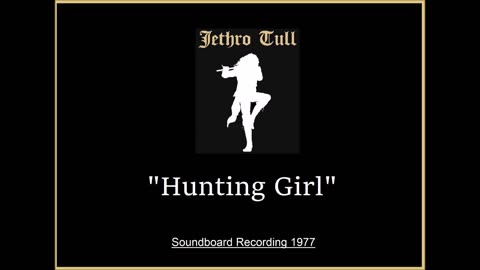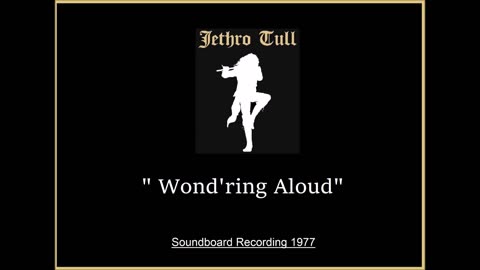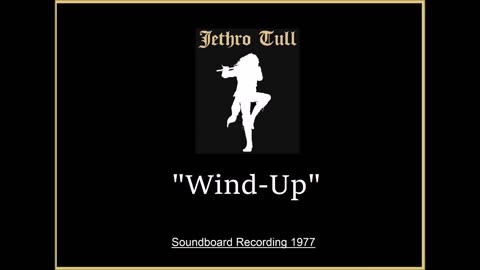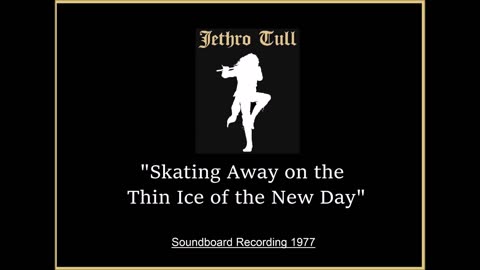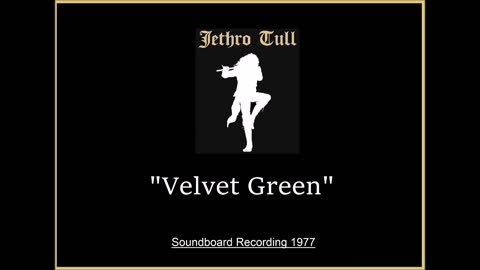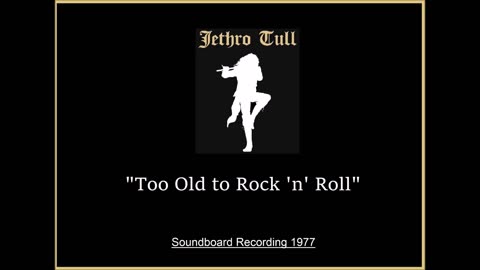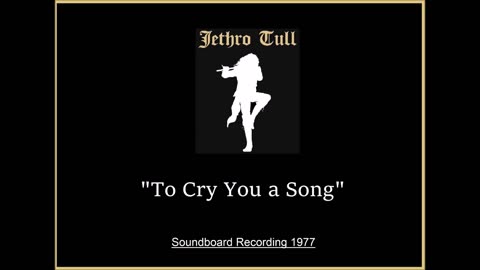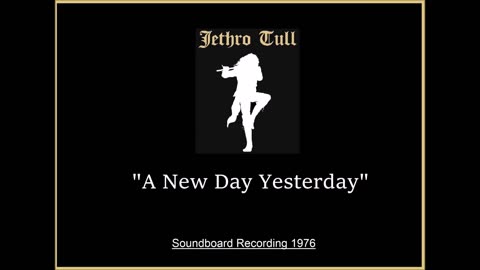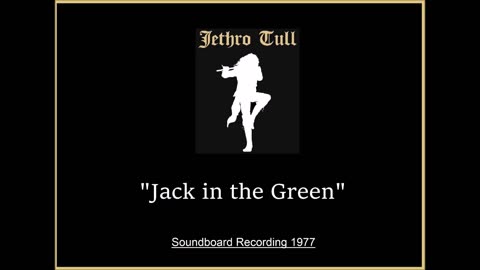
Jethro Tull Playlist
25 videos
Updated 1 month ago
Jethro Tull, a progressive rock band from Blackpool, England, formed in 1967 by Ian Anderson, Martin Barre, and Glenn Cornick, blended flute melodies and complex riffs to shape the 1970s with albums like Aqualung and Thick as a Brick. Their live shows filled theaters and festivals with intricate rhythms and folk-rock energy, getting crowds moving from London to New York.
This playlist of live classics puts you in the front row, with tracks that hit the spot for rocking out or chilling. #JethroTull #LiveMusic #ProgressiveRock
-
Jethro Tull - Jack In The Green (Live in Manchester, England 1977) Soundboard
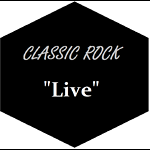 Classic Rock Live Music (High Quality Audio)Jethro Tull Playlist https://rumble.com/playlists/DKjq1zUljlY?e9s=src_v1_upp_pl Jethro Tull are a British rock band formed in Blackpool, Lancashire in 1967. Initially playing blues rock and jazz fusion, the band soon incorporated elements of English folk music, hard rock and classical music, forging a signature progressive rock sound. The group's founder, bandleader, principal composer, lead vocalist, and only constant member is Ian Anderson, a multi-instrumentalist who mainly plays flute and acoustic guitar. The group has featured a succession of musicians throughout the decades, including significant contributors such as guitarists Mick Abrahams and Martin Barre (with Barre being the longest-serving member besides Anderson); bassists Glenn Cornick, Jeffrey Hammond, John Glascock, Dave Pegg, Jonathan Noyce, and David Goodier; drummers Clive Bunker, Barrie "Barriemore" Barlow and Doane Perry; and keyboardists John Evan, Dee Palmer, Peter-John Vettese, Andrew Giddings, Eddie Jobson, and John O'Hara. The band achieved moderate recognition in the London club scene and released their debut album, This Was, in 1968. After a line-up change which saw original guitarist Mick Abrahams replaced by Martin Barre, the band released a folk-tinged second album, Stand Up, in 1969. Stand Up, which reached No. 1 in the UK, gave the band their first commercial success. The band soon embarked on a heavy schedule of touring and recording, releasing one studio album every year until 1980. Their musical style shifted in the direction of progressive rock starting with Aqualung (1971), which went on to become the band's most commercially successful album. Their musical style shifted again to folk rock in the late 1970s. In the early 1980s the band underwent a major line-up change and began to lean into electronic rock. The band won their sole Grammy Award for the 1987 album Crest of a Knave, which saw them returning to a hard-rock style. Jethro Tull have sold an estimated 60 million albums worldwide, with 11 gold and 5 platinum albums. The band ceased studio recording activity in the 2000s, but continued to tour until splitting in 2011. Following the band's split, Anderson and Barre continued to record and tour as solo artists, with Anderson's band billed variously as both "Jethro Tull" and "Ian Anderson" solo. Anderson said in 2014 that Jethro Tull had come "more or less to an end". Starting in 2017 however, Anderson revived the Jethro Tull name and returned to releasing new studio albums in the 2020s. The current group includes musicians who were part of Jethro Tull during the last years of its initial run, as well as newer musicians associated with Anderson's solo band, without Barre's involvement. This Was (1968) Stand Up (1969) Benefit (1970) Aqualung (1971) Thick as a Brick (1972) A Passion Play (1973) War Child (1974) Minstrel in the Gallery (1975) Too Old to Rock 'n' Roll: Too Young to Die! (1976) Songs from the Wood (1977) Heavy Horses (1978) Stormwatch (1979) A (1980) The Broadsword and the Beast (1982) Under Wraps (1984) Crest of a Knave (1987) Rock Island (1989) Catfish Rising (1991) Roots to Branches (1995) J-Tull Dot Com (1999) The Jethro Tull Christmas Album (2003) The Zealot Gene (2022) RökFlöte (2023) Curious Ruminant (2025)179 views
Classic Rock Live Music (High Quality Audio)Jethro Tull Playlist https://rumble.com/playlists/DKjq1zUljlY?e9s=src_v1_upp_pl Jethro Tull are a British rock band formed in Blackpool, Lancashire in 1967. Initially playing blues rock and jazz fusion, the band soon incorporated elements of English folk music, hard rock and classical music, forging a signature progressive rock sound. The group's founder, bandleader, principal composer, lead vocalist, and only constant member is Ian Anderson, a multi-instrumentalist who mainly plays flute and acoustic guitar. The group has featured a succession of musicians throughout the decades, including significant contributors such as guitarists Mick Abrahams and Martin Barre (with Barre being the longest-serving member besides Anderson); bassists Glenn Cornick, Jeffrey Hammond, John Glascock, Dave Pegg, Jonathan Noyce, and David Goodier; drummers Clive Bunker, Barrie "Barriemore" Barlow and Doane Perry; and keyboardists John Evan, Dee Palmer, Peter-John Vettese, Andrew Giddings, Eddie Jobson, and John O'Hara. The band achieved moderate recognition in the London club scene and released their debut album, This Was, in 1968. After a line-up change which saw original guitarist Mick Abrahams replaced by Martin Barre, the band released a folk-tinged second album, Stand Up, in 1969. Stand Up, which reached No. 1 in the UK, gave the band their first commercial success. The band soon embarked on a heavy schedule of touring and recording, releasing one studio album every year until 1980. Their musical style shifted in the direction of progressive rock starting with Aqualung (1971), which went on to become the band's most commercially successful album. Their musical style shifted again to folk rock in the late 1970s. In the early 1980s the band underwent a major line-up change and began to lean into electronic rock. The band won their sole Grammy Award for the 1987 album Crest of a Knave, which saw them returning to a hard-rock style. Jethro Tull have sold an estimated 60 million albums worldwide, with 11 gold and 5 platinum albums. The band ceased studio recording activity in the 2000s, but continued to tour until splitting in 2011. Following the band's split, Anderson and Barre continued to record and tour as solo artists, with Anderson's band billed variously as both "Jethro Tull" and "Ian Anderson" solo. Anderson said in 2014 that Jethro Tull had come "more or less to an end". Starting in 2017 however, Anderson revived the Jethro Tull name and returned to releasing new studio albums in the 2020s. The current group includes musicians who were part of Jethro Tull during the last years of its initial run, as well as newer musicians associated with Anderson's solo band, without Barre's involvement. This Was (1968) Stand Up (1969) Benefit (1970) Aqualung (1971) Thick as a Brick (1972) A Passion Play (1973) War Child (1974) Minstrel in the Gallery (1975) Too Old to Rock 'n' Roll: Too Young to Die! (1976) Songs from the Wood (1977) Heavy Horses (1978) Stormwatch (1979) A (1980) The Broadsword and the Beast (1982) Under Wraps (1984) Crest of a Knave (1987) Rock Island (1989) Catfish Rising (1991) Roots to Branches (1995) J-Tull Dot Com (1999) The Jethro Tull Christmas Album (2003) The Zealot Gene (2022) RökFlöte (2023) Curious Ruminant (2025)179 views -
Jethro Tull - Locomotive Breath (Live in Manchester, England 1977) Soundboard
 Classic Rock Live Music (High Quality Audio)Jethro Tull Playlist https://rumble.com/playlists/DKjq1zUljlY?e9s=src_v1_upp_pl Jethro Tull are a British rock band formed in Blackpool, Lancashire in 1967. Initially playing blues rock and jazz fusion, the band soon incorporated elements of English folk music, hard rock and classical music, forging a signature progressive rock sound. The group's founder, bandleader, principal composer, lead vocalist, and only constant member is Ian Anderson, a multi-instrumentalist who mainly plays flute and acoustic guitar. The group has featured a succession of musicians throughout the decades, including significant contributors such as guitarists Mick Abrahams and Martin Barre (with Barre being the longest-serving member besides Anderson); bassists Glenn Cornick, Jeffrey Hammond, John Glascock, Dave Pegg, Jonathan Noyce, and David Goodier; drummers Clive Bunker, Barrie "Barriemore" Barlow and Doane Perry; and keyboardists John Evan, Dee Palmer, Peter-John Vettese, Andrew Giddings, Eddie Jobson, and John O'Hara. The band achieved moderate recognition in the London club scene and released their debut album, This Was, in 1968. After a line-up change which saw original guitarist Mick Abrahams replaced by Martin Barre, the band released a folk-tinged second album, Stand Up, in 1969. Stand Up, which reached No. 1 in the UK, gave the band their first commercial success. The band soon embarked on a heavy schedule of touring and recording, releasing one studio album every year until 1980. Their musical style shifted in the direction of progressive rock starting with Aqualung (1971), which went on to become the band's most commercially successful album. Their musical style shifted again to folk rock in the late 1970s. In the early 1980s the band underwent a major line-up change and began to lean into electronic rock. The band won their sole Grammy Award for the 1987 album Crest of a Knave, which saw them returning to a hard-rock style. Jethro Tull have sold an estimated 60 million albums worldwide, with 11 gold and 5 platinum albums. The band ceased studio recording activity in the 2000s, but continued to tour until splitting in 2011. Following the band's split, Anderson and Barre continued to record and tour as solo artists, with Anderson's band billed variously as both "Jethro Tull" and "Ian Anderson" solo. Anderson said in 2014 that Jethro Tull had come "more or less to an end". Starting in 2017 however, Anderson revived the Jethro Tull name and returned to releasing new studio albums in the 2020s. The current group includes musicians who were part of Jethro Tull during the last years of its initial run, as well as newer musicians associated with Anderson's solo band, without Barre's involvement. This Was (1968) Stand Up (1969) Benefit (1970) Aqualung (1971) Thick as a Brick (1972) A Passion Play (1973) War Child (1974) Minstrel in the Gallery (1975) Too Old to Rock 'n' Roll: Too Young to Die! (1976) Songs from the Wood (1977) Heavy Horses (1978) Stormwatch (1979) A (1980) The Broadsword and the Beast (1982) Under Wraps (1984) Crest of a Knave (1987) Rock Island (1989) Catfish Rising (1991) Roots to Branches (1995) J-Tull Dot Com (1999) The Jethro Tull Christmas Album (2003) The Zealot Gene (2022) RökFlöte (2023) Curious Ruminant (2025)278 views
Classic Rock Live Music (High Quality Audio)Jethro Tull Playlist https://rumble.com/playlists/DKjq1zUljlY?e9s=src_v1_upp_pl Jethro Tull are a British rock band formed in Blackpool, Lancashire in 1967. Initially playing blues rock and jazz fusion, the band soon incorporated elements of English folk music, hard rock and classical music, forging a signature progressive rock sound. The group's founder, bandleader, principal composer, lead vocalist, and only constant member is Ian Anderson, a multi-instrumentalist who mainly plays flute and acoustic guitar. The group has featured a succession of musicians throughout the decades, including significant contributors such as guitarists Mick Abrahams and Martin Barre (with Barre being the longest-serving member besides Anderson); bassists Glenn Cornick, Jeffrey Hammond, John Glascock, Dave Pegg, Jonathan Noyce, and David Goodier; drummers Clive Bunker, Barrie "Barriemore" Barlow and Doane Perry; and keyboardists John Evan, Dee Palmer, Peter-John Vettese, Andrew Giddings, Eddie Jobson, and John O'Hara. The band achieved moderate recognition in the London club scene and released their debut album, This Was, in 1968. After a line-up change which saw original guitarist Mick Abrahams replaced by Martin Barre, the band released a folk-tinged second album, Stand Up, in 1969. Stand Up, which reached No. 1 in the UK, gave the band their first commercial success. The band soon embarked on a heavy schedule of touring and recording, releasing one studio album every year until 1980. Their musical style shifted in the direction of progressive rock starting with Aqualung (1971), which went on to become the band's most commercially successful album. Their musical style shifted again to folk rock in the late 1970s. In the early 1980s the band underwent a major line-up change and began to lean into electronic rock. The band won their sole Grammy Award for the 1987 album Crest of a Knave, which saw them returning to a hard-rock style. Jethro Tull have sold an estimated 60 million albums worldwide, with 11 gold and 5 platinum albums. The band ceased studio recording activity in the 2000s, but continued to tour until splitting in 2011. Following the band's split, Anderson and Barre continued to record and tour as solo artists, with Anderson's band billed variously as both "Jethro Tull" and "Ian Anderson" solo. Anderson said in 2014 that Jethro Tull had come "more or less to an end". Starting in 2017 however, Anderson revived the Jethro Tull name and returned to releasing new studio albums in the 2020s. The current group includes musicians who were part of Jethro Tull during the last years of its initial run, as well as newer musicians associated with Anderson's solo band, without Barre's involvement. This Was (1968) Stand Up (1969) Benefit (1970) Aqualung (1971) Thick as a Brick (1972) A Passion Play (1973) War Child (1974) Minstrel in the Gallery (1975) Too Old to Rock 'n' Roll: Too Young to Die! (1976) Songs from the Wood (1977) Heavy Horses (1978) Stormwatch (1979) A (1980) The Broadsword and the Beast (1982) Under Wraps (1984) Crest of a Knave (1987) Rock Island (1989) Catfish Rising (1991) Roots to Branches (1995) J-Tull Dot Com (1999) The Jethro Tull Christmas Album (2003) The Zealot Gene (2022) RökFlöte (2023) Curious Ruminant (2025)278 views -
Jethro Tull - Hunting Girl (Live in Manchester, England 1977) Soundboard
 Classic Rock Live Music (High Quality Audio)Jethro Tull Playlist https://rumble.com/playlists/DKjq1zUljlY?e9s=src_v1_upp_pl Jethro Tull are a British rock band formed in Blackpool, Lancashire in 1967. Initially playing blues rock and jazz fusion, the band soon incorporated elements of English folk music, hard rock and classical music, forging a signature progressive rock sound. The group's founder, bandleader, principal composer, lead vocalist, and only constant member is Ian Anderson, a multi-instrumentalist who mainly plays flute and acoustic guitar. The group has featured a succession of musicians throughout the decades, including significant contributors such as guitarists Mick Abrahams and Martin Barre (with Barre being the longest-serving member besides Anderson); bassists Glenn Cornick, Jeffrey Hammond, John Glascock, Dave Pegg, Jonathan Noyce, and David Goodier; drummers Clive Bunker, Barrie "Barriemore" Barlow and Doane Perry; and keyboardists John Evan, Dee Palmer, Peter-John Vettese, Andrew Giddings, Eddie Jobson, and John O'Hara. The band achieved moderate recognition in the London club scene and released their debut album, This Was, in 1968. After a line-up change which saw original guitarist Mick Abrahams replaced by Martin Barre, the band released a folk-tinged second album, Stand Up, in 1969. Stand Up, which reached No. 1 in the UK, gave the band their first commercial success. The band soon embarked on a heavy schedule of touring and recording, releasing one studio album every year until 1980. Their musical style shifted in the direction of progressive rock starting with Aqualung (1971), which went on to become the band's most commercially successful album. Their musical style shifted again to folk rock in the late 1970s. In the early 1980s the band underwent a major line-up change and began to lean into electronic rock. The band won their sole Grammy Award for the 1987 album Crest of a Knave, which saw them returning to a hard-rock style. Jethro Tull have sold an estimated 60 million albums worldwide, with 11 gold and 5 platinum albums. The band ceased studio recording activity in the 2000s, but continued to tour until splitting in 2011. Following the band's split, Anderson and Barre continued to record and tour as solo artists, with Anderson's band billed variously as both "Jethro Tull" and "Ian Anderson" solo. Anderson said in 2014 that Jethro Tull had come "more or less to an end". Starting in 2017 however, Anderson revived the Jethro Tull name and returned to releasing new studio albums in the 2020s. The current group includes musicians who were part of Jethro Tull during the last years of its initial run, as well as newer musicians associated with Anderson's solo band, without Barre's involvement. This Was (1968) Stand Up (1969) Benefit (1970) Aqualung (1971) Thick as a Brick (1972) A Passion Play (1973) War Child (1974) Minstrel in the Gallery (1975) Too Old to Rock 'n' Roll: Too Young to Die! (1976) Songs from the Wood (1977) Heavy Horses (1978) Stormwatch (1979) A (1980) The Broadsword and the Beast (1982) Under Wraps (1984) Crest of a Knave (1987) Rock Island (1989) Catfish Rising (1991) Roots to Branches (1995) J-Tull Dot Com (1999) The Jethro Tull Christmas Album (2003) The Zealot Gene (2022) RökFlöte (2023) Curious Ruminant (2025)314 views
Classic Rock Live Music (High Quality Audio)Jethro Tull Playlist https://rumble.com/playlists/DKjq1zUljlY?e9s=src_v1_upp_pl Jethro Tull are a British rock band formed in Blackpool, Lancashire in 1967. Initially playing blues rock and jazz fusion, the band soon incorporated elements of English folk music, hard rock and classical music, forging a signature progressive rock sound. The group's founder, bandleader, principal composer, lead vocalist, and only constant member is Ian Anderson, a multi-instrumentalist who mainly plays flute and acoustic guitar. The group has featured a succession of musicians throughout the decades, including significant contributors such as guitarists Mick Abrahams and Martin Barre (with Barre being the longest-serving member besides Anderson); bassists Glenn Cornick, Jeffrey Hammond, John Glascock, Dave Pegg, Jonathan Noyce, and David Goodier; drummers Clive Bunker, Barrie "Barriemore" Barlow and Doane Perry; and keyboardists John Evan, Dee Palmer, Peter-John Vettese, Andrew Giddings, Eddie Jobson, and John O'Hara. The band achieved moderate recognition in the London club scene and released their debut album, This Was, in 1968. After a line-up change which saw original guitarist Mick Abrahams replaced by Martin Barre, the band released a folk-tinged second album, Stand Up, in 1969. Stand Up, which reached No. 1 in the UK, gave the band their first commercial success. The band soon embarked on a heavy schedule of touring and recording, releasing one studio album every year until 1980. Their musical style shifted in the direction of progressive rock starting with Aqualung (1971), which went on to become the band's most commercially successful album. Their musical style shifted again to folk rock in the late 1970s. In the early 1980s the band underwent a major line-up change and began to lean into electronic rock. The band won their sole Grammy Award for the 1987 album Crest of a Knave, which saw them returning to a hard-rock style. Jethro Tull have sold an estimated 60 million albums worldwide, with 11 gold and 5 platinum albums. The band ceased studio recording activity in the 2000s, but continued to tour until splitting in 2011. Following the band's split, Anderson and Barre continued to record and tour as solo artists, with Anderson's band billed variously as both "Jethro Tull" and "Ian Anderson" solo. Anderson said in 2014 that Jethro Tull had come "more or less to an end". Starting in 2017 however, Anderson revived the Jethro Tull name and returned to releasing new studio albums in the 2020s. The current group includes musicians who were part of Jethro Tull during the last years of its initial run, as well as newer musicians associated with Anderson's solo band, without Barre's involvement. This Was (1968) Stand Up (1969) Benefit (1970) Aqualung (1971) Thick as a Brick (1972) A Passion Play (1973) War Child (1974) Minstrel in the Gallery (1975) Too Old to Rock 'n' Roll: Too Young to Die! (1976) Songs from the Wood (1977) Heavy Horses (1978) Stormwatch (1979) A (1980) The Broadsword and the Beast (1982) Under Wraps (1984) Crest of a Knave (1987) Rock Island (1989) Catfish Rising (1991) Roots to Branches (1995) J-Tull Dot Com (1999) The Jethro Tull Christmas Album (2003) The Zealot Gene (2022) RökFlöte (2023) Curious Ruminant (2025)314 views -
Jethro Tull - Wond'ring Aloud (Live in Manchester, England 1977) Soundboard
 Classic Rock Live Music (High Quality Audio)Jethro Tull Playlist https://rumble.com/playlists/DKjq1zUljlY?e9s=src_v1_upp_pl Jethro Tull are a British rock band formed in Blackpool, Lancashire in 1967. Initially playing blues rock and jazz fusion, the band soon incorporated elements of English folk music, hard rock and classical music, forging a signature progressive rock sound. The group's founder, bandleader, principal composer, lead vocalist, and only constant member is Ian Anderson, a multi-instrumentalist who mainly plays flute and acoustic guitar. The group has featured a succession of musicians throughout the decades, including significant contributors such as guitarists Mick Abrahams and Martin Barre (with Barre being the longest-serving member besides Anderson); bassists Glenn Cornick, Jeffrey Hammond, John Glascock, Dave Pegg, Jonathan Noyce, and David Goodier; drummers Clive Bunker, Barrie "Barriemore" Barlow and Doane Perry; and keyboardists John Evan, Dee Palmer, Peter-John Vettese, Andrew Giddings, Eddie Jobson, and John O'Hara. The band achieved moderate recognition in the London club scene and released their debut album, This Was, in 1968. After a line-up change which saw original guitarist Mick Abrahams replaced by Martin Barre, the band released a folk-tinged second album, Stand Up, in 1969. Stand Up, which reached No. 1 in the UK, gave the band their first commercial success. The band soon embarked on a heavy schedule of touring and recording, releasing one studio album every year until 1980. Their musical style shifted in the direction of progressive rock starting with Aqualung (1971), which went on to become the band's most commercially successful album. Their musical style shifted again to folk rock in the late 1970s. In the early 1980s the band underwent a major line-up change and began to lean into electronic rock. The band won their sole Grammy Award for the 1987 album Crest of a Knave, which saw them returning to a hard-rock style. Jethro Tull have sold an estimated 60 million albums worldwide, with 11 gold and 5 platinum albums. The band ceased studio recording activity in the 2000s, but continued to tour until splitting in 2011. Following the band's split, Anderson and Barre continued to record and tour as solo artists, with Anderson's band billed variously as both "Jethro Tull" and "Ian Anderson" solo. Anderson said in 2014 that Jethro Tull had come "more or less to an end". Starting in 2017 however, Anderson revived the Jethro Tull name and returned to releasing new studio albums in the 2020s. The current group includes musicians who were part of Jethro Tull during the last years of its initial run, as well as newer musicians associated with Anderson's solo band, without Barre's involvement. This Was (1968) Stand Up (1969) Benefit (1970) Aqualung (1971) Thick as a Brick (1972) A Passion Play (1973) War Child (1974) Minstrel in the Gallery (1975) Too Old to Rock 'n' Roll: Too Young to Die! (1976) Songs from the Wood (1977) Heavy Horses (1978) Stormwatch (1979) A (1980) The Broadsword and the Beast (1982) Under Wraps (1984) Crest of a Knave (1987) Rock Island (1989) Catfish Rising (1991) Roots to Branches (1995) J-Tull Dot Com (1999) The Jethro Tull Christmas Album (2003) The Zealot Gene (2022) RökFlöte (2023) Curious Ruminant (2025)274 views
Classic Rock Live Music (High Quality Audio)Jethro Tull Playlist https://rumble.com/playlists/DKjq1zUljlY?e9s=src_v1_upp_pl Jethro Tull are a British rock band formed in Blackpool, Lancashire in 1967. Initially playing blues rock and jazz fusion, the band soon incorporated elements of English folk music, hard rock and classical music, forging a signature progressive rock sound. The group's founder, bandleader, principal composer, lead vocalist, and only constant member is Ian Anderson, a multi-instrumentalist who mainly plays flute and acoustic guitar. The group has featured a succession of musicians throughout the decades, including significant contributors such as guitarists Mick Abrahams and Martin Barre (with Barre being the longest-serving member besides Anderson); bassists Glenn Cornick, Jeffrey Hammond, John Glascock, Dave Pegg, Jonathan Noyce, and David Goodier; drummers Clive Bunker, Barrie "Barriemore" Barlow and Doane Perry; and keyboardists John Evan, Dee Palmer, Peter-John Vettese, Andrew Giddings, Eddie Jobson, and John O'Hara. The band achieved moderate recognition in the London club scene and released their debut album, This Was, in 1968. After a line-up change which saw original guitarist Mick Abrahams replaced by Martin Barre, the band released a folk-tinged second album, Stand Up, in 1969. Stand Up, which reached No. 1 in the UK, gave the band their first commercial success. The band soon embarked on a heavy schedule of touring and recording, releasing one studio album every year until 1980. Their musical style shifted in the direction of progressive rock starting with Aqualung (1971), which went on to become the band's most commercially successful album. Their musical style shifted again to folk rock in the late 1970s. In the early 1980s the band underwent a major line-up change and began to lean into electronic rock. The band won their sole Grammy Award for the 1987 album Crest of a Knave, which saw them returning to a hard-rock style. Jethro Tull have sold an estimated 60 million albums worldwide, with 11 gold and 5 platinum albums. The band ceased studio recording activity in the 2000s, but continued to tour until splitting in 2011. Following the band's split, Anderson and Barre continued to record and tour as solo artists, with Anderson's band billed variously as both "Jethro Tull" and "Ian Anderson" solo. Anderson said in 2014 that Jethro Tull had come "more or less to an end". Starting in 2017 however, Anderson revived the Jethro Tull name and returned to releasing new studio albums in the 2020s. The current group includes musicians who were part of Jethro Tull during the last years of its initial run, as well as newer musicians associated with Anderson's solo band, without Barre's involvement. This Was (1968) Stand Up (1969) Benefit (1970) Aqualung (1971) Thick as a Brick (1972) A Passion Play (1973) War Child (1974) Minstrel in the Gallery (1975) Too Old to Rock 'n' Roll: Too Young to Die! (1976) Songs from the Wood (1977) Heavy Horses (1978) Stormwatch (1979) A (1980) The Broadsword and the Beast (1982) Under Wraps (1984) Crest of a Knave (1987) Rock Island (1989) Catfish Rising (1991) Roots to Branches (1995) J-Tull Dot Com (1999) The Jethro Tull Christmas Album (2003) The Zealot Gene (2022) RökFlöte (2023) Curious Ruminant (2025)274 views -
Jethro Tull - Wind-Up (Live in Manchester, England 1977) Soundboard
 Classic Rock Live Music (High Quality Audio)Jethro Tull Playlist https://rumble.com/playlists/DKjq1zUljlY?e9s=src_v1_upp_pl Jethro Tull are a British rock band formed in Blackpool, Lancashire in 1967. Initially playing blues rock and jazz fusion, the band soon incorporated elements of English folk music, hard rock and classical music, forging a signature progressive rock sound. The group's founder, bandleader, principal composer, lead vocalist, and only constant member is Ian Anderson, a multi-instrumentalist who mainly plays flute and acoustic guitar. The group has featured a succession of musicians throughout the decades, including significant contributors such as guitarists Mick Abrahams and Martin Barre (with Barre being the longest-serving member besides Anderson); bassists Glenn Cornick, Jeffrey Hammond, John Glascock, Dave Pegg, Jonathan Noyce, and David Goodier; drummers Clive Bunker, Barrie "Barriemore" Barlow and Doane Perry; and keyboardists John Evan, Dee Palmer, Peter-John Vettese, Andrew Giddings, Eddie Jobson, and John O'Hara. The band achieved moderate recognition in the London club scene and released their debut album, This Was, in 1968. After a line-up change which saw original guitarist Mick Abrahams replaced by Martin Barre, the band released a folk-tinged second album, Stand Up, in 1969. Stand Up, which reached No. 1 in the UK, gave the band their first commercial success. The band soon embarked on a heavy schedule of touring and recording, releasing one studio album every year until 1980. Their musical style shifted in the direction of progressive rock starting with Aqualung (1971), which went on to become the band's most commercially successful album. Their musical style shifted again to folk rock in the late 1970s. In the early 1980s the band underwent a major line-up change and began to lean into electronic rock. The band won their sole Grammy Award for the 1987 album Crest of a Knave, which saw them returning to a hard-rock style. Jethro Tull have sold an estimated 60 million albums worldwide, with 11 gold and 5 platinum albums. The band ceased studio recording activity in the 2000s, but continued to tour until splitting in 2011. Following the band's split, Anderson and Barre continued to record and tour as solo artists, with Anderson's band billed variously as both "Jethro Tull" and "Ian Anderson" solo. Anderson said in 2014 that Jethro Tull had come "more or less to an end". Starting in 2017 however, Anderson revived the Jethro Tull name and returned to releasing new studio albums in the 2020s. The current group includes musicians who were part of Jethro Tull during the last years of its initial run, as well as newer musicians associated with Anderson's solo band, without Barre's involvement. This Was (1968) Stand Up (1969) Benefit (1970) Aqualung (1971) Thick as a Brick (1972) A Passion Play (1973) War Child (1974) Minstrel in the Gallery (1975) Too Old to Rock 'n' Roll: Too Young to Die! (1976) Songs from the Wood (1977) Heavy Horses (1978) Stormwatch (1979) A (1980) The Broadsword and the Beast (1982) Under Wraps (1984) Crest of a Knave (1987) Rock Island (1989) Catfish Rising (1991) Roots to Branches (1995) J-Tull Dot Com (1999) The Jethro Tull Christmas Album (2003) The Zealot Gene (2022) RökFlöte (2023) Curious Ruminant (2025)324 views
Classic Rock Live Music (High Quality Audio)Jethro Tull Playlist https://rumble.com/playlists/DKjq1zUljlY?e9s=src_v1_upp_pl Jethro Tull are a British rock band formed in Blackpool, Lancashire in 1967. Initially playing blues rock and jazz fusion, the band soon incorporated elements of English folk music, hard rock and classical music, forging a signature progressive rock sound. The group's founder, bandleader, principal composer, lead vocalist, and only constant member is Ian Anderson, a multi-instrumentalist who mainly plays flute and acoustic guitar. The group has featured a succession of musicians throughout the decades, including significant contributors such as guitarists Mick Abrahams and Martin Barre (with Barre being the longest-serving member besides Anderson); bassists Glenn Cornick, Jeffrey Hammond, John Glascock, Dave Pegg, Jonathan Noyce, and David Goodier; drummers Clive Bunker, Barrie "Barriemore" Barlow and Doane Perry; and keyboardists John Evan, Dee Palmer, Peter-John Vettese, Andrew Giddings, Eddie Jobson, and John O'Hara. The band achieved moderate recognition in the London club scene and released their debut album, This Was, in 1968. After a line-up change which saw original guitarist Mick Abrahams replaced by Martin Barre, the band released a folk-tinged second album, Stand Up, in 1969. Stand Up, which reached No. 1 in the UK, gave the band their first commercial success. The band soon embarked on a heavy schedule of touring and recording, releasing one studio album every year until 1980. Their musical style shifted in the direction of progressive rock starting with Aqualung (1971), which went on to become the band's most commercially successful album. Their musical style shifted again to folk rock in the late 1970s. In the early 1980s the band underwent a major line-up change and began to lean into electronic rock. The band won their sole Grammy Award for the 1987 album Crest of a Knave, which saw them returning to a hard-rock style. Jethro Tull have sold an estimated 60 million albums worldwide, with 11 gold and 5 platinum albums. The band ceased studio recording activity in the 2000s, but continued to tour until splitting in 2011. Following the band's split, Anderson and Barre continued to record and tour as solo artists, with Anderson's band billed variously as both "Jethro Tull" and "Ian Anderson" solo. Anderson said in 2014 that Jethro Tull had come "more or less to an end". Starting in 2017 however, Anderson revived the Jethro Tull name and returned to releasing new studio albums in the 2020s. The current group includes musicians who were part of Jethro Tull during the last years of its initial run, as well as newer musicians associated with Anderson's solo band, without Barre's involvement. This Was (1968) Stand Up (1969) Benefit (1970) Aqualung (1971) Thick as a Brick (1972) A Passion Play (1973) War Child (1974) Minstrel in the Gallery (1975) Too Old to Rock 'n' Roll: Too Young to Die! (1976) Songs from the Wood (1977) Heavy Horses (1978) Stormwatch (1979) A (1980) The Broadsword and the Beast (1982) Under Wraps (1984) Crest of a Knave (1987) Rock Island (1989) Catfish Rising (1991) Roots to Branches (1995) J-Tull Dot Com (1999) The Jethro Tull Christmas Album (2003) The Zealot Gene (2022) RökFlöte (2023) Curious Ruminant (2025)324 views -
Jethro Tull - Skating Away (Live in Manchester, England 1977) Soundboard
 Classic Rock Live Music (High Quality Audio)Jethro Tull Playlist https://rumble.com/playlists/DKjq1zUljlY?e9s=src_v1_upp_pl Jethro Tull are a British rock band formed in Blackpool, Lancashire in 1967. Initially playing blues rock and jazz fusion, the band soon incorporated elements of English folk music, hard rock and classical music, forging a signature progressive rock sound. The group's founder, bandleader, principal composer, lead vocalist, and only constant member is Ian Anderson, a multi-instrumentalist who mainly plays flute and acoustic guitar. The group has featured a succession of musicians throughout the decades, including significant contributors such as guitarists Mick Abrahams and Martin Barre (with Barre being the longest-serving member besides Anderson); bassists Glenn Cornick, Jeffrey Hammond, John Glascock, Dave Pegg, Jonathan Noyce, and David Goodier; drummers Clive Bunker, Barrie "Barriemore" Barlow and Doane Perry; and keyboardists John Evan, Dee Palmer, Peter-John Vettese, Andrew Giddings, Eddie Jobson, and John O'Hara. The band achieved moderate recognition in the London club scene and released their debut album, This Was, in 1968. After a line-up change which saw original guitarist Mick Abrahams replaced by Martin Barre, the band released a folk-tinged second album, Stand Up, in 1969. Stand Up, which reached No. 1 in the UK, gave the band their first commercial success. The band soon embarked on a heavy schedule of touring and recording, releasing one studio album every year until 1980. Their musical style shifted in the direction of progressive rock starting with Aqualung (1971), which went on to become the band's most commercially successful album. Their musical style shifted again to folk rock in the late 1970s. In the early 1980s the band underwent a major line-up change and began to lean into electronic rock. The band won their sole Grammy Award for the 1987 album Crest of a Knave, which saw them returning to a hard-rock style. Jethro Tull have sold an estimated 60 million albums worldwide, with 11 gold and 5 platinum albums. The band ceased studio recording activity in the 2000s, but continued to tour until splitting in 2011. Following the band's split, Anderson and Barre continued to record and tour as solo artists, with Anderson's band billed variously as both "Jethro Tull" and "Ian Anderson" solo. Anderson said in 2014 that Jethro Tull had come "more or less to an end". Starting in 2017 however, Anderson revived the Jethro Tull name and returned to releasing new studio albums in the 2020s. The current group includes musicians who were part of Jethro Tull during the last years of its initial run, as well as newer musicians associated with Anderson's solo band, without Barre's involvement. This Was (1968) Stand Up (1969) Benefit (1970) Aqualung (1971) Thick as a Brick (1972) A Passion Play (1973) War Child (1974) Minstrel in the Gallery (1975) Too Old to Rock 'n' Roll: Too Young to Die! (1976) Songs from the Wood (1977) Heavy Horses (1978) Stormwatch (1979) A (1980) The Broadsword and the Beast (1982) Under Wraps (1984) Crest of a Knave (1987) Rock Island (1989) Catfish Rising (1991) Roots to Branches (1995) J-Tull Dot Com (1999) The Jethro Tull Christmas Album (2003) The Zealot Gene (2022) RökFlöte (2023) Curious Ruminant (2025)228 views
Classic Rock Live Music (High Quality Audio)Jethro Tull Playlist https://rumble.com/playlists/DKjq1zUljlY?e9s=src_v1_upp_pl Jethro Tull are a British rock band formed in Blackpool, Lancashire in 1967. Initially playing blues rock and jazz fusion, the band soon incorporated elements of English folk music, hard rock and classical music, forging a signature progressive rock sound. The group's founder, bandleader, principal composer, lead vocalist, and only constant member is Ian Anderson, a multi-instrumentalist who mainly plays flute and acoustic guitar. The group has featured a succession of musicians throughout the decades, including significant contributors such as guitarists Mick Abrahams and Martin Barre (with Barre being the longest-serving member besides Anderson); bassists Glenn Cornick, Jeffrey Hammond, John Glascock, Dave Pegg, Jonathan Noyce, and David Goodier; drummers Clive Bunker, Barrie "Barriemore" Barlow and Doane Perry; and keyboardists John Evan, Dee Palmer, Peter-John Vettese, Andrew Giddings, Eddie Jobson, and John O'Hara. The band achieved moderate recognition in the London club scene and released their debut album, This Was, in 1968. After a line-up change which saw original guitarist Mick Abrahams replaced by Martin Barre, the band released a folk-tinged second album, Stand Up, in 1969. Stand Up, which reached No. 1 in the UK, gave the band their first commercial success. The band soon embarked on a heavy schedule of touring and recording, releasing one studio album every year until 1980. Their musical style shifted in the direction of progressive rock starting with Aqualung (1971), which went on to become the band's most commercially successful album. Their musical style shifted again to folk rock in the late 1970s. In the early 1980s the band underwent a major line-up change and began to lean into electronic rock. The band won their sole Grammy Award for the 1987 album Crest of a Knave, which saw them returning to a hard-rock style. Jethro Tull have sold an estimated 60 million albums worldwide, with 11 gold and 5 platinum albums. The band ceased studio recording activity in the 2000s, but continued to tour until splitting in 2011. Following the band's split, Anderson and Barre continued to record and tour as solo artists, with Anderson's band billed variously as both "Jethro Tull" and "Ian Anderson" solo. Anderson said in 2014 that Jethro Tull had come "more or less to an end". Starting in 2017 however, Anderson revived the Jethro Tull name and returned to releasing new studio albums in the 2020s. The current group includes musicians who were part of Jethro Tull during the last years of its initial run, as well as newer musicians associated with Anderson's solo band, without Barre's involvement. This Was (1968) Stand Up (1969) Benefit (1970) Aqualung (1971) Thick as a Brick (1972) A Passion Play (1973) War Child (1974) Minstrel in the Gallery (1975) Too Old to Rock 'n' Roll: Too Young to Die! (1976) Songs from the Wood (1977) Heavy Horses (1978) Stormwatch (1979) A (1980) The Broadsword and the Beast (1982) Under Wraps (1984) Crest of a Knave (1987) Rock Island (1989) Catfish Rising (1991) Roots to Branches (1995) J-Tull Dot Com (1999) The Jethro Tull Christmas Album (2003) The Zealot Gene (2022) RökFlöte (2023) Curious Ruminant (2025)228 views -
Jethro Tull - Velvet Green (Live in Manchester, England 1977) Soundboard
 Classic Rock Live Music (High Quality Audio)Jethro Tull Playlist https://rumble.com/playlists/DKjq1zUljlY?e9s=src_v1_upp_pl Jethro Tull are a British rock band formed in Blackpool, Lancashire in 1967. Initially playing blues rock and jazz fusion, the band soon incorporated elements of English folk music, hard rock and classical music, forging a signature progressive rock sound. The group's founder, bandleader, principal composer, lead vocalist, and only constant member is Ian Anderson, a multi-instrumentalist who mainly plays flute and acoustic guitar. The group has featured a succession of musicians throughout the decades, including significant contributors such as guitarists Mick Abrahams and Martin Barre (with Barre being the longest-serving member besides Anderson); bassists Glenn Cornick, Jeffrey Hammond, John Glascock, Dave Pegg, Jonathan Noyce, and David Goodier; drummers Clive Bunker, Barrie "Barriemore" Barlow and Doane Perry; and keyboardists John Evan, Dee Palmer, Peter-John Vettese, Andrew Giddings, Eddie Jobson, and John O'Hara. The band achieved moderate recognition in the London club scene and released their debut album, This Was, in 1968. After a line-up change which saw original guitarist Mick Abrahams replaced by Martin Barre, the band released a folk-tinged second album, Stand Up, in 1969. Stand Up, which reached No. 1 in the UK, gave the band their first commercial success. The band soon embarked on a heavy schedule of touring and recording, releasing one studio album every year until 1980. Their musical style shifted in the direction of progressive rock starting with Aqualung (1971), which went on to become the band's most commercially successful album. Their musical style shifted again to folk rock in the late 1970s. In the early 1980s the band underwent a major line-up change and began to lean into electronic rock. The band won their sole Grammy Award for the 1987 album Crest of a Knave, which saw them returning to a hard-rock style. Jethro Tull have sold an estimated 60 million albums worldwide, with 11 gold and 5 platinum albums. The band ceased studio recording activity in the 2000s, but continued to tour until splitting in 2011. Following the band's split, Anderson and Barre continued to record and tour as solo artists, with Anderson's band billed variously as both "Jethro Tull" and "Ian Anderson" solo. Anderson said in 2014 that Jethro Tull had come "more or less to an end". Starting in 2017 however, Anderson revived the Jethro Tull name and returned to releasing new studio albums in the 2020s. The current group includes musicians who were part of Jethro Tull during the last years of its initial run, as well as newer musicians associated with Anderson's solo band, without Barre's involvement. This Was (1968) Stand Up (1969) Benefit (1970) Aqualung (1971) Thick as a Brick (1972) A Passion Play (1973) War Child (1974) Minstrel in the Gallery (1975) Too Old to Rock 'n' Roll: Too Young to Die! (1976) Songs from the Wood (1977) Heavy Horses (1978) Stormwatch (1979) A (1980) The Broadsword and the Beast (1982) Under Wraps (1984) Crest of a Knave (1987) Rock Island (1989) Catfish Rising (1991) Roots to Branches (1995) J-Tull Dot Com (1999) The Jethro Tull Christmas Album (2003) The Zealot Gene (2022) RökFlöte (2023) Curious Ruminant (2025)181 views
Classic Rock Live Music (High Quality Audio)Jethro Tull Playlist https://rumble.com/playlists/DKjq1zUljlY?e9s=src_v1_upp_pl Jethro Tull are a British rock band formed in Blackpool, Lancashire in 1967. Initially playing blues rock and jazz fusion, the band soon incorporated elements of English folk music, hard rock and classical music, forging a signature progressive rock sound. The group's founder, bandleader, principal composer, lead vocalist, and only constant member is Ian Anderson, a multi-instrumentalist who mainly plays flute and acoustic guitar. The group has featured a succession of musicians throughout the decades, including significant contributors such as guitarists Mick Abrahams and Martin Barre (with Barre being the longest-serving member besides Anderson); bassists Glenn Cornick, Jeffrey Hammond, John Glascock, Dave Pegg, Jonathan Noyce, and David Goodier; drummers Clive Bunker, Barrie "Barriemore" Barlow and Doane Perry; and keyboardists John Evan, Dee Palmer, Peter-John Vettese, Andrew Giddings, Eddie Jobson, and John O'Hara. The band achieved moderate recognition in the London club scene and released their debut album, This Was, in 1968. After a line-up change which saw original guitarist Mick Abrahams replaced by Martin Barre, the band released a folk-tinged second album, Stand Up, in 1969. Stand Up, which reached No. 1 in the UK, gave the band their first commercial success. The band soon embarked on a heavy schedule of touring and recording, releasing one studio album every year until 1980. Their musical style shifted in the direction of progressive rock starting with Aqualung (1971), which went on to become the band's most commercially successful album. Their musical style shifted again to folk rock in the late 1970s. In the early 1980s the band underwent a major line-up change and began to lean into electronic rock. The band won their sole Grammy Award for the 1987 album Crest of a Knave, which saw them returning to a hard-rock style. Jethro Tull have sold an estimated 60 million albums worldwide, with 11 gold and 5 platinum albums. The band ceased studio recording activity in the 2000s, but continued to tour until splitting in 2011. Following the band's split, Anderson and Barre continued to record and tour as solo artists, with Anderson's band billed variously as both "Jethro Tull" and "Ian Anderson" solo. Anderson said in 2014 that Jethro Tull had come "more or less to an end". Starting in 2017 however, Anderson revived the Jethro Tull name and returned to releasing new studio albums in the 2020s. The current group includes musicians who were part of Jethro Tull during the last years of its initial run, as well as newer musicians associated with Anderson's solo band, without Barre's involvement. This Was (1968) Stand Up (1969) Benefit (1970) Aqualung (1971) Thick as a Brick (1972) A Passion Play (1973) War Child (1974) Minstrel in the Gallery (1975) Too Old to Rock 'n' Roll: Too Young to Die! (1976) Songs from the Wood (1977) Heavy Horses (1978) Stormwatch (1979) A (1980) The Broadsword and the Beast (1982) Under Wraps (1984) Crest of a Knave (1987) Rock Island (1989) Catfish Rising (1991) Roots to Branches (1995) J-Tull Dot Com (1999) The Jethro Tull Christmas Album (2003) The Zealot Gene (2022) RökFlöte (2023) Curious Ruminant (2025)181 views -
Jethro Tull - Too Old to Rock 'n' Roll (Live in Manchester, England 1977) Soundboard
 Classic Rock Live Music (High Quality Audio)Jethro Tull Playlist https://rumble.com/playlists/DKjq1zUljlY?e9s=src_v1_upp_pl Jethro Tull are a British rock band formed in Blackpool, Lancashire in 1967. Initially playing blues rock and jazz fusion, the band soon incorporated elements of English folk music, hard rock and classical music, forging a signature progressive rock sound. The group's founder, bandleader, principal composer, lead vocalist, and only constant member is Ian Anderson, a multi-instrumentalist who mainly plays flute and acoustic guitar. The group has featured a succession of musicians throughout the decades, including significant contributors such as guitarists Mick Abrahams and Martin Barre (with Barre being the longest-serving member besides Anderson); bassists Glenn Cornick, Jeffrey Hammond, John Glascock, Dave Pegg, Jonathan Noyce, and David Goodier; drummers Clive Bunker, Barrie "Barriemore" Barlow and Doane Perry; and keyboardists John Evan, Dee Palmer, Peter-John Vettese, Andrew Giddings, Eddie Jobson, and John O'Hara. The band achieved moderate recognition in the London club scene and released their debut album, This Was, in 1968. After a line-up change which saw original guitarist Mick Abrahams replaced by Martin Barre, the band released a folk-tinged second album, Stand Up, in 1969. Stand Up, which reached No. 1 in the UK, gave the band their first commercial success. The band soon embarked on a heavy schedule of touring and recording, releasing one studio album every year until 1980. Their musical style shifted in the direction of progressive rock starting with Aqualung (1971), which went on to become the band's most commercially successful album. Their musical style shifted again to folk rock in the late 1970s. In the early 1980s the band underwent a major line-up change and began to lean into electronic rock. The band won their sole Grammy Award for the 1987 album Crest of a Knave, which saw them returning to a hard-rock style. Jethro Tull have sold an estimated 60 million albums worldwide, with 11 gold and 5 platinum albums. The band ceased studio recording activity in the 2000s, but continued to tour until splitting in 2011. Following the band's split, Anderson and Barre continued to record and tour as solo artists, with Anderson's band billed variously as both "Jethro Tull" and "Ian Anderson" solo. Anderson said in 2014 that Jethro Tull had come "more or less to an end". Starting in 2017 however, Anderson revived the Jethro Tull name and returned to releasing new studio albums in the 2020s. The current group includes musicians who were part of Jethro Tull during the last years of its initial run, as well as newer musicians associated with Anderson's solo band, without Barre's involvement. This Was (1968) Stand Up (1969) Benefit (1970) Aqualung (1971) Thick as a Brick (1972) A Passion Play (1973) War Child (1974) Minstrel in the Gallery (1975) Too Old to Rock 'n' Roll: Too Young to Die! (1976) Songs from the Wood (1977) Heavy Horses (1978) Stormwatch (1979) A (1980) The Broadsword and the Beast (1982) Under Wraps (1984) Crest of a Knave (1987) Rock Island (1989) Catfish Rising (1991) Roots to Branches (1995) J-Tull Dot Com (1999) The Jethro Tull Christmas Album (2003) The Zealot Gene (2022) RökFlöte (2023) Curious Ruminant (2025)321 views
Classic Rock Live Music (High Quality Audio)Jethro Tull Playlist https://rumble.com/playlists/DKjq1zUljlY?e9s=src_v1_upp_pl Jethro Tull are a British rock band formed in Blackpool, Lancashire in 1967. Initially playing blues rock and jazz fusion, the band soon incorporated elements of English folk music, hard rock and classical music, forging a signature progressive rock sound. The group's founder, bandleader, principal composer, lead vocalist, and only constant member is Ian Anderson, a multi-instrumentalist who mainly plays flute and acoustic guitar. The group has featured a succession of musicians throughout the decades, including significant contributors such as guitarists Mick Abrahams and Martin Barre (with Barre being the longest-serving member besides Anderson); bassists Glenn Cornick, Jeffrey Hammond, John Glascock, Dave Pegg, Jonathan Noyce, and David Goodier; drummers Clive Bunker, Barrie "Barriemore" Barlow and Doane Perry; and keyboardists John Evan, Dee Palmer, Peter-John Vettese, Andrew Giddings, Eddie Jobson, and John O'Hara. The band achieved moderate recognition in the London club scene and released their debut album, This Was, in 1968. After a line-up change which saw original guitarist Mick Abrahams replaced by Martin Barre, the band released a folk-tinged second album, Stand Up, in 1969. Stand Up, which reached No. 1 in the UK, gave the band their first commercial success. The band soon embarked on a heavy schedule of touring and recording, releasing one studio album every year until 1980. Their musical style shifted in the direction of progressive rock starting with Aqualung (1971), which went on to become the band's most commercially successful album. Their musical style shifted again to folk rock in the late 1970s. In the early 1980s the band underwent a major line-up change and began to lean into electronic rock. The band won their sole Grammy Award for the 1987 album Crest of a Knave, which saw them returning to a hard-rock style. Jethro Tull have sold an estimated 60 million albums worldwide, with 11 gold and 5 platinum albums. The band ceased studio recording activity in the 2000s, but continued to tour until splitting in 2011. Following the band's split, Anderson and Barre continued to record and tour as solo artists, with Anderson's band billed variously as both "Jethro Tull" and "Ian Anderson" solo. Anderson said in 2014 that Jethro Tull had come "more or less to an end". Starting in 2017 however, Anderson revived the Jethro Tull name and returned to releasing new studio albums in the 2020s. The current group includes musicians who were part of Jethro Tull during the last years of its initial run, as well as newer musicians associated with Anderson's solo band, without Barre's involvement. This Was (1968) Stand Up (1969) Benefit (1970) Aqualung (1971) Thick as a Brick (1972) A Passion Play (1973) War Child (1974) Minstrel in the Gallery (1975) Too Old to Rock 'n' Roll: Too Young to Die! (1976) Songs from the Wood (1977) Heavy Horses (1978) Stormwatch (1979) A (1980) The Broadsword and the Beast (1982) Under Wraps (1984) Crest of a Knave (1987) Rock Island (1989) Catfish Rising (1991) Roots to Branches (1995) J-Tull Dot Com (1999) The Jethro Tull Christmas Album (2003) The Zealot Gene (2022) RökFlöte (2023) Curious Ruminant (2025)321 views -
Jethro Tull - To Cry You a Song (Live in Manchester, England 1977) Soundboard
 Classic Rock Live Music (High Quality Audio)Jethro Tull Playlist https://rumble.com/playlists/DKjq1zUljlY?e9s=src_v1_upp_pl Jethro Tull are a British rock band formed in Blackpool, Lancashire in 1967. Initially playing blues rock and jazz fusion, the band soon incorporated elements of English folk music, hard rock and classical music, forging a signature progressive rock sound. The group's founder, bandleader, principal composer, lead vocalist, and only constant member is Ian Anderson, a multi-instrumentalist who mainly plays flute and acoustic guitar. The group has featured a succession of musicians throughout the decades, including significant contributors such as guitarists Mick Abrahams and Martin Barre (with Barre being the longest-serving member besides Anderson); bassists Glenn Cornick, Jeffrey Hammond, John Glascock, Dave Pegg, Jonathan Noyce, and David Goodier; drummers Clive Bunker, Barrie "Barriemore" Barlow and Doane Perry; and keyboardists John Evan, Dee Palmer, Peter-John Vettese, Andrew Giddings, Eddie Jobson, and John O'Hara. The band achieved moderate recognition in the London club scene and released their debut album, This Was, in 1968. After a line-up change which saw original guitarist Mick Abrahams replaced by Martin Barre, the band released a folk-tinged second album, Stand Up, in 1969. Stand Up, which reached No. 1 in the UK, gave the band their first commercial success. The band soon embarked on a heavy schedule of touring and recording, releasing one studio album every year until 1980. Their musical style shifted in the direction of progressive rock starting with Aqualung (1971), which went on to become the band's most commercially successful album. Their musical style shifted again to folk rock in the late 1970s. In the early 1980s the band underwent a major line-up change and began to lean into electronic rock. The band won their sole Grammy Award for the 1987 album Crest of a Knave, which saw them returning to a hard-rock style. Jethro Tull have sold an estimated 60 million albums worldwide, with 11 gold and 5 platinum albums. The band ceased studio recording activity in the 2000s, but continued to tour until splitting in 2011. Following the band's split, Anderson and Barre continued to record and tour as solo artists, with Anderson's band billed variously as both "Jethro Tull" and "Ian Anderson" solo. Anderson said in 2014 that Jethro Tull had come "more or less to an end". Starting in 2017 however, Anderson revived the Jethro Tull name and returned to releasing new studio albums in the 2020s. The current group includes musicians who were part of Jethro Tull during the last years of its initial run, as well as newer musicians associated with Anderson's solo band, without Barre's involvement. This Was (1968) Stand Up (1969) Benefit (1970) Aqualung (1971) Thick as a Brick (1972) A Passion Play (1973) War Child (1974) Minstrel in the Gallery (1975) Too Old to Rock 'n' Roll: Too Young to Die! (1976) Songs from the Wood (1977) Heavy Horses (1978) Stormwatch (1979) A (1980) The Broadsword and the Beast (1982) Under Wraps (1984) Crest of a Knave (1987) Rock Island (1989) Catfish Rising (1991) Roots to Branches (1995) J-Tull Dot Com (1999) The Jethro Tull Christmas Album (2003) The Zealot Gene (2022) RökFlöte (2023) Curious Ruminant (2025)197 views
Classic Rock Live Music (High Quality Audio)Jethro Tull Playlist https://rumble.com/playlists/DKjq1zUljlY?e9s=src_v1_upp_pl Jethro Tull are a British rock band formed in Blackpool, Lancashire in 1967. Initially playing blues rock and jazz fusion, the band soon incorporated elements of English folk music, hard rock and classical music, forging a signature progressive rock sound. The group's founder, bandleader, principal composer, lead vocalist, and only constant member is Ian Anderson, a multi-instrumentalist who mainly plays flute and acoustic guitar. The group has featured a succession of musicians throughout the decades, including significant contributors such as guitarists Mick Abrahams and Martin Barre (with Barre being the longest-serving member besides Anderson); bassists Glenn Cornick, Jeffrey Hammond, John Glascock, Dave Pegg, Jonathan Noyce, and David Goodier; drummers Clive Bunker, Barrie "Barriemore" Barlow and Doane Perry; and keyboardists John Evan, Dee Palmer, Peter-John Vettese, Andrew Giddings, Eddie Jobson, and John O'Hara. The band achieved moderate recognition in the London club scene and released their debut album, This Was, in 1968. After a line-up change which saw original guitarist Mick Abrahams replaced by Martin Barre, the band released a folk-tinged second album, Stand Up, in 1969. Stand Up, which reached No. 1 in the UK, gave the band their first commercial success. The band soon embarked on a heavy schedule of touring and recording, releasing one studio album every year until 1980. Their musical style shifted in the direction of progressive rock starting with Aqualung (1971), which went on to become the band's most commercially successful album. Their musical style shifted again to folk rock in the late 1970s. In the early 1980s the band underwent a major line-up change and began to lean into electronic rock. The band won their sole Grammy Award for the 1987 album Crest of a Knave, which saw them returning to a hard-rock style. Jethro Tull have sold an estimated 60 million albums worldwide, with 11 gold and 5 platinum albums. The band ceased studio recording activity in the 2000s, but continued to tour until splitting in 2011. Following the band's split, Anderson and Barre continued to record and tour as solo artists, with Anderson's band billed variously as both "Jethro Tull" and "Ian Anderson" solo. Anderson said in 2014 that Jethro Tull had come "more or less to an end". Starting in 2017 however, Anderson revived the Jethro Tull name and returned to releasing new studio albums in the 2020s. The current group includes musicians who were part of Jethro Tull during the last years of its initial run, as well as newer musicians associated with Anderson's solo band, without Barre's involvement. This Was (1968) Stand Up (1969) Benefit (1970) Aqualung (1971) Thick as a Brick (1972) A Passion Play (1973) War Child (1974) Minstrel in the Gallery (1975) Too Old to Rock 'n' Roll: Too Young to Die! (1976) Songs from the Wood (1977) Heavy Horses (1978) Stormwatch (1979) A (1980) The Broadsword and the Beast (1982) Under Wraps (1984) Crest of a Knave (1987) Rock Island (1989) Catfish Rising (1991) Roots to Branches (1995) J-Tull Dot Com (1999) The Jethro Tull Christmas Album (2003) The Zealot Gene (2022) RökFlöte (2023) Curious Ruminant (2025)197 views -
Jethro Tull - A New Day Yesterday (Live in Tampa, Florida 1976) Soundboard
 Classic Rock Live Music (High Quality Audio)Jethro Tull Playlist https://rumble.com/playlists/DKjq1zUljlY?e9s=src_v1_upp_pl Jethro Tull are a British rock band formed in Blackpool, Lancashire in 1967. Initially playing blues rock and jazz fusion, the band soon incorporated elements of English folk music, hard rock and classical music, forging a signature progressive rock sound. The group's founder, bandleader, principal composer, lead vocalist, and only constant member is Ian Anderson, a multi-instrumentalist who mainly plays flute and acoustic guitar. The group has featured a succession of musicians throughout the decades, including significant contributors such as guitarists Mick Abrahams and Martin Barre (with Barre being the longest-serving member besides Anderson); bassists Glenn Cornick, Jeffrey Hammond, John Glascock, Dave Pegg, Jonathan Noyce, and David Goodier; drummers Clive Bunker, Barrie "Barriemore" Barlow and Doane Perry; and keyboardists John Evan, Dee Palmer, Peter-John Vettese, Andrew Giddings, Eddie Jobson, and John O'Hara. The band achieved moderate recognition in the London club scene and released their debut album, This Was, in 1968. After a line-up change which saw original guitarist Mick Abrahams replaced by Martin Barre, the band released a folk-tinged second album, Stand Up, in 1969. Stand Up, which reached No. 1 in the UK, gave the band their first commercial success. The band soon embarked on a heavy schedule of touring and recording, releasing one studio album every year until 1980. Their musical style shifted in the direction of progressive rock starting with Aqualung (1971), which went on to become the band's most commercially successful album. Their musical style shifted again to folk rock in the late 1970s. In the early 1980s the band underwent a major line-up change and began to lean into electronic rock. The band won their sole Grammy Award for the 1987 album Crest of a Knave, which saw them returning to a hard-rock style. Jethro Tull have sold an estimated 60 million albums worldwide, with 11 gold and 5 platinum albums. The band ceased studio recording activity in the 2000s, but continued to tour until splitting in 2011. Following the band's split, Anderson and Barre continued to record and tour as solo artists, with Anderson's band billed variously as both "Jethro Tull" and "Ian Anderson" solo. Anderson said in 2014 that Jethro Tull had come "more or less to an end". Starting in 2017 however, Anderson revived the Jethro Tull name and returned to releasing new studio albums in the 2020s. The current group includes musicians who were part of Jethro Tull during the last years of its initial run, as well as newer musicians associated with Anderson's solo band, without Barre's involvement. This Was (1968) Stand Up (1969) Benefit (1970) Aqualung (1971) Thick as a Brick (1972) A Passion Play (1973) War Child (1974) Minstrel in the Gallery (1975) Too Old to Rock 'n' Roll: Too Young to Die! (1976) Songs from the Wood (1977) Heavy Horses (1978) Stormwatch (1979) A (1980) The Broadsword and the Beast (1982) Under Wraps (1984) Crest of a Knave (1987) Rock Island (1989) Catfish Rising (1991) Roots to Branches (1995) J-Tull Dot Com (1999) The Jethro Tull Christmas Album (2003) The Zealot Gene (2022) RökFlöte (2023) Curious Ruminant (2025) Slight edit during flute solo286 views
Classic Rock Live Music (High Quality Audio)Jethro Tull Playlist https://rumble.com/playlists/DKjq1zUljlY?e9s=src_v1_upp_pl Jethro Tull are a British rock band formed in Blackpool, Lancashire in 1967. Initially playing blues rock and jazz fusion, the band soon incorporated elements of English folk music, hard rock and classical music, forging a signature progressive rock sound. The group's founder, bandleader, principal composer, lead vocalist, and only constant member is Ian Anderson, a multi-instrumentalist who mainly plays flute and acoustic guitar. The group has featured a succession of musicians throughout the decades, including significant contributors such as guitarists Mick Abrahams and Martin Barre (with Barre being the longest-serving member besides Anderson); bassists Glenn Cornick, Jeffrey Hammond, John Glascock, Dave Pegg, Jonathan Noyce, and David Goodier; drummers Clive Bunker, Barrie "Barriemore" Barlow and Doane Perry; and keyboardists John Evan, Dee Palmer, Peter-John Vettese, Andrew Giddings, Eddie Jobson, and John O'Hara. The band achieved moderate recognition in the London club scene and released their debut album, This Was, in 1968. After a line-up change which saw original guitarist Mick Abrahams replaced by Martin Barre, the band released a folk-tinged second album, Stand Up, in 1969. Stand Up, which reached No. 1 in the UK, gave the band their first commercial success. The band soon embarked on a heavy schedule of touring and recording, releasing one studio album every year until 1980. Their musical style shifted in the direction of progressive rock starting with Aqualung (1971), which went on to become the band's most commercially successful album. Their musical style shifted again to folk rock in the late 1970s. In the early 1980s the band underwent a major line-up change and began to lean into electronic rock. The band won their sole Grammy Award for the 1987 album Crest of a Knave, which saw them returning to a hard-rock style. Jethro Tull have sold an estimated 60 million albums worldwide, with 11 gold and 5 platinum albums. The band ceased studio recording activity in the 2000s, but continued to tour until splitting in 2011. Following the band's split, Anderson and Barre continued to record and tour as solo artists, with Anderson's band billed variously as both "Jethro Tull" and "Ian Anderson" solo. Anderson said in 2014 that Jethro Tull had come "more or less to an end". Starting in 2017 however, Anderson revived the Jethro Tull name and returned to releasing new studio albums in the 2020s. The current group includes musicians who were part of Jethro Tull during the last years of its initial run, as well as newer musicians associated with Anderson's solo band, without Barre's involvement. This Was (1968) Stand Up (1969) Benefit (1970) Aqualung (1971) Thick as a Brick (1972) A Passion Play (1973) War Child (1974) Minstrel in the Gallery (1975) Too Old to Rock 'n' Roll: Too Young to Die! (1976) Songs from the Wood (1977) Heavy Horses (1978) Stormwatch (1979) A (1980) The Broadsword and the Beast (1982) Under Wraps (1984) Crest of a Knave (1987) Rock Island (1989) Catfish Rising (1991) Roots to Branches (1995) J-Tull Dot Com (1999) The Jethro Tull Christmas Album (2003) The Zealot Gene (2022) RökFlöte (2023) Curious Ruminant (2025) Slight edit during flute solo286 views
